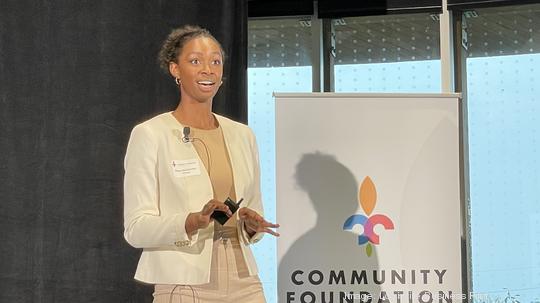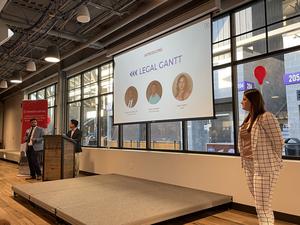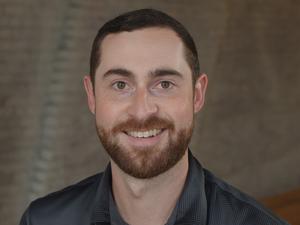
Five years ago, Maya McClendon was reaching a breaking point in her collegiate volleyball career.
The former University of Louisville athlete was running on empty. Her days started with a 4:30 a.m. mandatory breakfast and ended with a chemistry lab that would last until 10 p.m., not including the hours in between she spent practicing and doing homework.
"I was losing control of my own life," McClendon said. "And I was a captain, so my teammates would come to me with their own mental health struggles and I would have the energy to help them, but I didn't have time for myself."
That level of burnout led her to have a mental health emergency, which factored into her decision to transfer to Arizona State University. Then, when McClendon was six-months into studying for the Medical College Admissions Test (MCAT), she got a phone call that ultimately changed her trajectory in life.
Her friend, a fellow volleyball player, died by suicide.
That earth-shattering news, coupled with McClendon's recognition of just how prevalent mental health struggles are for athletes, set her down a path of entrepreneurship after earning her bachelor's degree in psychology from ASU. Her Vogt Award-winning startup, The Sports Metaphor, is developing an application that will be able to assess and monitor athletes' psych health information and recommend research-backed and inclusive resources to improve mental health and resiliency.
The mental health app, Timeout, is made for athletes, by athletes, McClendon said. It offers a psych assessment, allowing artificial intelligence to step in and offer resources relative to the individual's experience. The startup's target market right now is NCAA universities, but she foresees expansion in to youth and professional sports, including the Olympics, in the coming years.
"This is a passion project of mine that turned into a business," she said. "I think that in order to preserve the integrity of what sports should mean, we're overdue for this holistic change.
"It really is going to take everyone to change this narrative and that's our motto: 'Let's redefine mental toughness together.'"
You can read more about McClendon and Timeout in the Q&A below:
Are there any lessons or skills you learned as an athlete that have given you an advantage as a founder? If so, what? Competing at a high level for any sport requires extreme dedication, commitment, sacrifice and self-determination. But for me, there are certain intangibles that I gained as a leader on and off the court, which has given me an advantage as a founder. In volleyball, each play is very fast paced and ends by a point earned or an error. As an undersized player, I was sometimes matched up with girls who were 6'6" and taller. This meant that I was blocked or rejected A LOT. The best skill I've gained from this, is to understand how to fail fast and find a way to focus on the next opportunity. There is always a way around large (road)blocks, even if you are the underdog.
What’s the best piece of advice you have ever received? Oftentimes the most successful people are the ones who just stay in it the longest. Just keep going.
Why is it more difficult for athletes to talk about their mental health struggles? Or why is it hard for them to seek out the resources they need? When you think of Lebron James or Serena Williams what do you think of? Pure power and strength. The athletic culture is often compared to military culture. You are expected to sacrifice everything for your team, at all costs. There is no room for mistakes, there is no room for complaining. If there is any indication of weakness, your opponent can capitalize on it and it could cost everything. Athletes aren't just competing against their opponents, we are also competing against our teammates and even ourselves. Most of us will do anything it takes to be even 1% better than our competition. The stigma of mental illness being associated with weakness makes it hard for us to even be seen reaching out for help.
What’s the biggest challenge or hurdle you’re facing in getting Timeout in the hands of athletes? Mental health is not an easy topic to address. It is a concept that is subjective for literally every human being, so it can be difficult to standardize. But this is why we are so focused on the research. We are spending most of our time focusing on the science behind our product, services and policies. When dealing with a problem that can be potentially fatal, we have to consider every failsafe to protect athletes.
Your degree is in psychology, how will that field research be utilized within the Timeout platform? My academic background in psychology is incorporated into the Timeout software in many ways. My personal experience and perspective as an athlete is intertwined with the years of research that we have accumulated to try to understand what factors affect athlete mental health, what subgroups are most vulnerable to which mental health risks and which interventions are most effective. We are also partnering with institutions to design research hypotheses, apply for research grants and publish research.
Sports Metaphor recently launched an ambassador program — who are you currently working with and what athletes would you like to work with in the future? We have been working with Nick Solak of the Texas Rangers and Chiaka Ogbogu, gold medalist on the USA Women's Volleyball National Team. We hope to work with an array of other elite athletes who have emerged as mental health advocates, like Simone Biles. Also, now that NIL (name, image, likeness) rules have passed we hope to work with local collegiate athletes.









